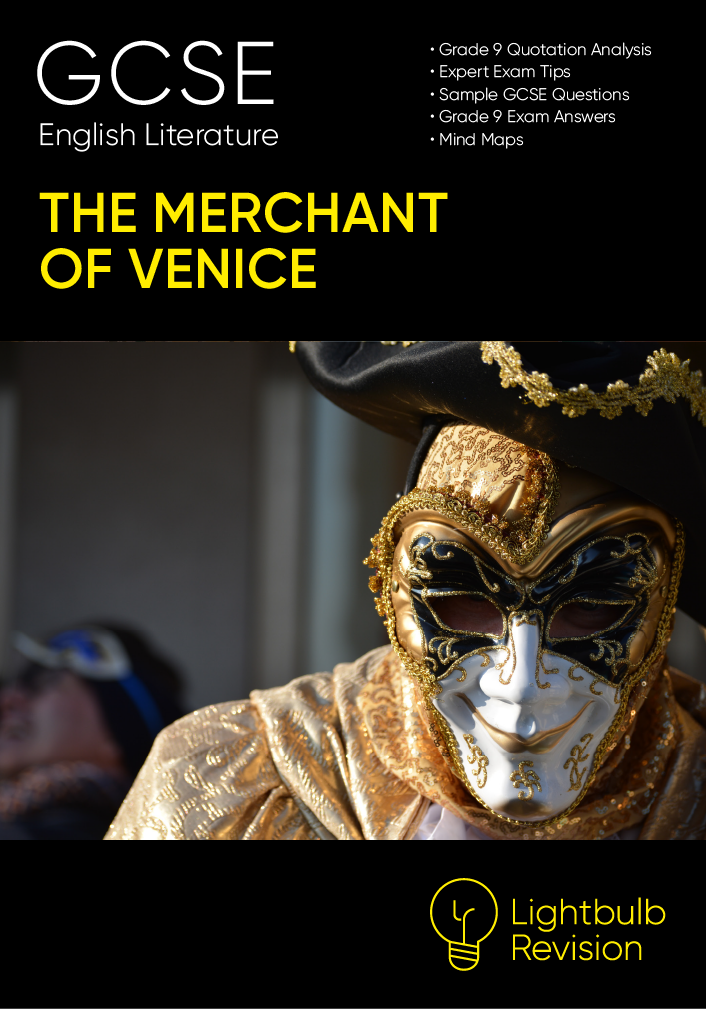Love
GCSE Exam Question and Answer
Question:
Read the following extract from Act 3 Scene 2.
Answer both questions below the text.
At this point in the play, Bassanio has chosen the lead casket and he and Portia are sealing their engagement.
PORTIA
Myself and what is mine to you and yours
Is now converted: but now I was the lord
Of this fair mansion, master of my servants,
Queen o’er myself: and even now, but now,
This house, these servants and this same myself
Are yours, my lord: I give them with this ring;
Which when you part from, lose, or give away,
Let it presage the ruin of your love
And be my vantage to exclaim on you.
BASSANIO
Madam, you have bereft me of all words,
Only my blood speaks to you in my veins;
And there is such confusion in my powers,
As after some oration fairly spoke
By a beloved prince, there doth appear
Among the buzzing pleased multitude;
Where every something, being blent together,
Turns to a wild of nothing, save of joy,
Express’d and not express’d. But when this ring
Parts from this finger, then parts life from hence:
O, then be bold to say Bassanio’s dead!
NERISSA
My lord and lady, it is now our time,
That have stood by and seen our wishes prosper,
To cry, good joy: good joy, my lord and lady!
GRATIANO
My lord Bassanio and my gentle lady,
I wish you all the joy that you can wish;
For I am sure you can wish none from me:
And when your honours mean to solemnize
The bargain of your faith, I do beseech you,
Even at that time I may be married too.
BASSANIO
With all my heart, so thou canst get a wife.
GRATIANO
I thank your lordship, you have got me one.
My eyes, my lord, can look as swift as yours:
You saw the mistress, I beheld the maid;
You loved, I loved for intermission.
No more pertains to me, my lord, than you.
a) Write about how love is presented in this extract.
b) Write about how love is presented in the play as a whole.
Start with the point that love is presented as a genuine emotion
This scene cements the love of Bassanio and Portia as Bassanio chooses the right casket and therefore wins Portia. Earlier in the play, Nerissa talks of how the casket task had been designed by Portia’s father to ensure that only a man who truly loves her will be able to choose the right casket, that she will ‘never be chosen by any rightly but one who shall rightly love’. The audience sees paternal love here as, from the grave, Portia’s father tries to protect his daughter from an unhappy marriage. Her father was clearly aware of the deceptive nature of love and how the lines between appearance and reality can be blurred. Bassanio’s successful completion of the task proves that he is the correct partner for Portia, and his delight is evident as he says ‘madam, you have bereft me of all words/ Only my blood speaks to you in my veins’. The metaphor shows how natural and passionate his love is; his whole body is reacting to Portia’s declaration of love, reinforcing the idea that their love is deep and true, and that there is a fundamental connection between them that means that they communicate on a raw, physical level.
Move to the point that love brings great happiness
This true love is seen as something to celebrate in the play. Nerissa joins in the celebrations as she calls out ‘good joy: good joy, my lord and lady!’ The repetition of ‘good joy’ and the exclamatory sentence reinforces that the union of Bassanio and Portia is something to rejoice in. This happiness that love brings is seen earlier when Jessica checks that it is Lorenzo who is come, disguised in a mask, to take her from Shylock’s house, and says ‘Lorenzo, certain, and my love indeed’. The use of ‘certain’ and ‘indeed’ captures Jessica’s relief and joy, and their utter commitment, as she is united with Lorenzo and leaves her home to be his bride. The delight in love is also reaffirmed in Act Five; newly-weds Lorenzo and Jessica talk of the moonlit night, comparing it to nights in which famous lovers met, such as ‘in such a night/ Troilus methinks mounted the Troyan walls’. The ideal of courtly love was revived in the Elizabethan era. It was the idealistic and noble admiration of lovers for each other and often referred to Greek mythology. Lorenzo and Jessica’s conversation represent this literary tradition, and show the pure and uplifting nature of love. Shakespeare also uses the moonlit night as a traditional setting for the lovers in Act Five, reinforcing the importance of love in the finale of the play.
Make the point that love can be seen as selfless and giving
Portia gives herself entirely to Bassanio, saying ‘this house, these servants and this same myself/ Are yours, my lord: I give them with this ring’. Her love is boundless and she holds nothing back as she gives all of her possessions and herself to her betrothed. Within love, there is a submission of power and the list emphasises that she is giving everything; interestingly, she places herself as the last item in the list, implying that the material possessions are of more interest. Indeed, in the 16th century, women were the property of their husbands with no legal rights. Portia’s words may seem generous and selfless yet they also reflect the stark reality of the situation as she, and and all of her property and wealth, does indeed now belong to Bassanio.
Move to the point that love is used as a plot device
Love is also used as a plot device as the relationships between the lovers, with all the associated problems, drive the plot. This scene is the culmination of the casket task and the audience, who have watched the other suitors fail the task, will have tensely waited for Bassanio to choose the right casket, and now can sit back, relieved, as true love is celebrated. There is also a neat mirroring of Portia and Bassanio’s relationship as Nerissa and Gratiano become engaged, and this mirroring is evident in Gratiano’s parallel sentence structure: ‘you saw the mistress, I beheld the maid’. It’s a satisfactory conclusion for the audience and fits the tradition of Shakespeare’s other plays such as ‘Much Ado About Nothing’ and ‘A Midsummer’s Night’s Dream’ where the couples all end up happily united.
Explore how far the play is a celebration of love
Despite the protestations of deep love in this extract, it could be argued that the relationships in the play do not necessarily celebrate love. Portia and Bassanio’s love can be viewed as a relationship based on a monetary transaction and physical appearance; at the start of the play, Bassanio describes Portia as a beautiful woman whose ‘sunny locks/ Hang on her temples like a golden fleece’. The simile shows that he is interested in her in terms of her appearance and her wealth. The golden fleece refers to the Greek myth in which Jason and his crew of Argonauts sailed in a quest which had the golden fleece as the prize. In the 16th century, marriages were often based at least in part on financial considerations and women were expected to bring a dowry (sum of money) to their marriage, and the way that Bassanio is interested in Portia as a prize suggests that he is motivated by her wealth rather than true love. Love is also seen as fickle as Gratiano states that he enjoys the thrill of the chase more than committed relationships, that women ‘are with more spirit chased than enjoy’d’; this does not bode well for his relationship with Nerissa. Similarly, there are possible cracks in Jessica and Lorenzo’s marriage already appearing by Act Five; her last words of the play are ‘I am never merry when I hear sweet music’, suggesting that, far from being a joyous bride, she is already melancholy. Depending on the production and the director’s choices, these more negative views of love could be emphasised and so undermine the idea of the pure, true love we might see on the surface.

Essential Exam Tips
• If you can use correct literary terminology (metaphor/imperative verbs etc), do use it! It makes your response much more convincing.
• Spend 5 minutes planning your answer; this helps you organise your ideas into a structure that is clear for the examiner.




